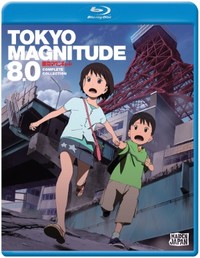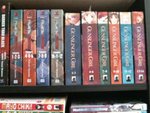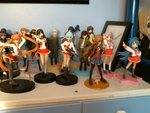Shelf Life
Soup Days
by Bamboo Dong,

Tokyo Magnitude 8.0 complete collection BD
Bodacious Space Pirates season 2 BD
Rental Shelf
Toriko part 3 DVD
Perishable
Nothing this week
Welcome to Shelf Life.
 Released roughly two years before the destructive and tragic Tohoku earthquake (magnitude 9.0), Tokyo Magnitude 8.0 is a little eerie to watch now. Before the start of every disc, there's a message that says that although the scenes of destruction depicted in the series are fictional, they're based on careful research and analysis, and are intended to be realistic conjecture on what would actually happen in a massive earthquake. We know this now. Even so, despite uncomfortable parallels to real life, it must be noted that although the series itself has its fair share of destruction scenes and safety warnings, its main purpose first and foremost is to tell a human story.
Released roughly two years before the destructive and tragic Tohoku earthquake (magnitude 9.0), Tokyo Magnitude 8.0 is a little eerie to watch now. Before the start of every disc, there's a message that says that although the scenes of destruction depicted in the series are fictional, they're based on careful research and analysis, and are intended to be realistic conjecture on what would actually happen in a massive earthquake. We know this now. Even so, despite uncomfortable parallels to real life, it must be noted that although the series itself has its fair share of destruction scenes and safety warnings, its main purpose first and foremost is to tell a human story.The series features three main players—sullen teenage girl Mirai, her cheery younger brother Yuuki, and a magnificent, selfless woman named Mari who serves as both their travel partner and surrogate mother as they all try to find their way home after a giant earthquake hits Tokyo. While Yuuki and Mari are both shining examples of how bolstering optimism and determination can be in the face of a crisis, the best character arc is that of Mirai, who starts the series as your typical, angry-at-the-world, aimless teenager. She hates her family (in that rebellious kind of way that many teens “hate” their families at that age), and she's quick to blame everyone else around her for the things that happen to her. Through her journey, though, she not only develops into a much more caring person, but comes to learn how to appreciate the loved ones in her life. It's a standard arc, but one that's deeply moving, and works well with the emotional hurricane that is this series.
Within its eleven episode run, Tokyo Magnitude 8.0 managed to make me simultaneously cherish and loathe humanity. We see the full spectrum of what humans are capable of—the selflessness of people like Mari, the tirelessness of medical professionals and volunteers, the ingenuity of engineers who've devoted their careers to designing rescue robots, and, unfortunately, the total awfulness of what seems like almost everybody else. For every scene of Mari helping a mother or child in need, there seem to be four more scenes of people being selfish jerks, be it snapping at lost children who are standing in the way, or people who can't be bothered to apologize for their harmful actions. The series is as much a celebration of humans as it is a damning indictment, and yet the overall message is an uplifting one—no matter what, the people you love, and who love you, are this world's greatest treasure.
Be warned, though, that few viewers will make it through Tokyo Magnitude 8.0 with dry eyes. Whether it's tender or tragic scenes along the way, or a cruel ending that will dismay you, the series puts you through the emotional wringer. Blessedly, for all its sadness, Tokyo Magnitude 8.0 does a good job of staying away from being disaster porn. Even though the show is riddled with endless scenes of aftershocks and buildings falling down, we rarely see humans directly involved. The implications are obvious enough—there is no need to actually show bodies being crushed or mangled, and I appreciate the series for not going there.
Tokyo Magnitude 8.0 is not light entertainment, in that the subject material isn't exactly going to fill your day with sunshine. The story itself is very straightforward, and the surprise ending takes a liiiiiiiitle too long to reveal itself from the point in which viewers have already figured it out, but it's very much worth watching. It's not necessarily groundbreaking, but the journey that Mirai, Yuuki, and Mari embark on is well-written and delicately balanced, and one that I feel glad to have witnessed.[TOP]
In contrast, Toriko is lighter than air, the Bud Light to Tokyo Magnitude's stout, the cotton candy to Tokyo Magnitude's 70% dark cacao.
 By far, the best reason to watch Toriko in its native Japanese language is to hear Setsuno croon, “Century suuuuuuuuuuuuuuuuppu.” Century Soup is not only one of the greatest, most coveted soups in the world, it is exceedingly rare in the only way that the fictional ingredients in Toriko can be. It's such a big deal that almost the entirety of the third part of Toriko is devoted to its acquisition, which is really great for people who like spending several hours watching one fight unfold, or watching a large pot of water boil. As the name might imply, Century Soup is soup that is only produced once in a century. Forever ago, some guy took a bunch of now-extinct gourmet animals and vegetables and froze them in a giant pillar of ice in the middle of a frozen island wasteland. There they remain, marinating in perpetual cryosleep, their icicle a frozen tomb to one delicious soup. Every hundred years or so, the temperatures in the ice caves fluctuate enough to melt some of the foodsicle, and Century Soup is created. It's so clear that you can't even see it, except for the rainbow aurora that surrounds it.
By far, the best reason to watch Toriko in its native Japanese language is to hear Setsuno croon, “Century suuuuuuuuuuuuuuuuppu.” Century Soup is not only one of the greatest, most coveted soups in the world, it is exceedingly rare in the only way that the fictional ingredients in Toriko can be. It's such a big deal that almost the entirety of the third part of Toriko is devoted to its acquisition, which is really great for people who like spending several hours watching one fight unfold, or watching a large pot of water boil. As the name might imply, Century Soup is soup that is only produced once in a century. Forever ago, some guy took a bunch of now-extinct gourmet animals and vegetables and froze them in a giant pillar of ice in the middle of a frozen island wasteland. There they remain, marinating in perpetual cryosleep, their icicle a frozen tomb to one delicious soup. Every hundred years or so, the temperatures in the ice caves fluctuate enough to melt some of the foodsicle, and Century Soup is created. It's so clear that you can't even see it, except for the rainbow aurora that surrounds it. Naturally, all sorts of folk are after this legendary soup. Amongst them are a handful of good guys with good hearts, Toriko and his chef partner Komatsu, and of course, bad guys from the Gourmet Corp. This time, the Gourmet Corp has sent out this creepy dude who incubates bugs inside his body, vomiting out a stream of insects every time he needs to battle a foe. Toriko may or may not be a match for this weirdo, but we won't know for several episodes. That's because this show has finally hit the Shonen Time Warp, where the hero can heal his injuries in five minutes, but takes a bajillion episodes to fight one guy. (In comparison, it takes roughly 1.5 episodes for Komatsu to whip up six months worth of blood, sweat, and soup.) For enthusiasts of such great classics like Dragonball, this is no sweat. For the rest of us, it's a little taxing. I want to eat Century Soup as much as the next soup enthusiast, but I don't want to spend thirteen episodes doing it. That means spending your hard-earned otaku cash on one boxset, and getting exactly one fight out of it. In the same amount of time, Ken Burns can cover the first three years of the American Civil War.
Look, I love Toriko. Every time I get a new boxset of Toriko, I do a little dance for joy, because I love the outlandishness of the fights, and Toriko's face every time he eats a rib. I love all the lame food portmanteaus at the beginning of each episode. I love the way Toriko will scream at a guy for not adhering to the same code of ethics he has, in regards to only killing for sustenance. What I don't really love is watching Toriko sweat for two episodes as he slowly unthaws his hand, which was frozen four episodes ago. It's a bit much, and it veers on boring.
I've been a staunch supporter of Toriko so far, but I wasn't thrilled by this particular boxset. I don't have the patience required to sit through shows like Dragonball. I'm all for individual story lines extending over several episodes, but I don't need to sit through ten episodes of Toriko figuring out that he can also kick, in addition to punch.
Regardless, my overall enthusiasm for Toriko hasn't been dampened. I still enjoy the series quite a bit, but I do wish that these episodes had been condensed quite a bit.[TOP]
Rounding out this week's reviews is Sentai's release of the second season of Bodacious Space Pirates.
 The last five episodes of Bodacious Space Pirates are perhaps the best episodes in the entire series. They're fun, they're rollicking, they're slightly cheesy (but in a really good way), they have good action scenes, and in general, they put the Bodacious and the Pirate in Bodacious Space Pirates. Sadly, the eight episodes previous to these are perhaps the worst episodes in the entire series. They're trivial, they're boring, and they don't really add anything to the series.
The last five episodes of Bodacious Space Pirates are perhaps the best episodes in the entire series. They're fun, they're rollicking, they're slightly cheesy (but in a really good way), they have good action scenes, and in general, they put the Bodacious and the Pirate in Bodacious Space Pirates. Sadly, the eight episodes previous to these are perhaps the worst episodes in the entire series. They're trivial, they're boring, and they don't really add anything to the series.I'm not quite sure what the thought process was. “We only have one good story left, so let's not blow our loads too early,” might have been one something that was mentioned at a writers' meeting at one point. Because what the first couple of story arcs are, are basically just a reminder that yes, there is indeed a ship called the Bentenmaru, and that indeed it has a crew, and that it is still captained by a normal everyday high school gal, with normal everyday high school pals. There's an arc where the girls from the yacht club help Marika do some pirating, which is cute and charming, but because viewers are aware that the series can do better, these episodes slog in comparison. There's another episode where the girls from the yacht club are invited back onto the ship to help Marika do some spring cleaning, but she loses her ID ring in the process. Some ominous music is played, but in the end, it's an innocent fake out. Another story involves the Bentenmaru crew coming down with some illness, but that too is resolved trivially and happily, despite the buildup.
Where this season really shines is the last several episodes, in the pirate hunting arc. Some bad guys have been going around, taking out pirate ships. In order to retaliate, Marika has called all her brethren pirates to arms to form a coalition. It's a little goofy—getting everyone to the round table involves an old timey pirate song and a legendary chef—but it's also a really good time. It's nice to see Marika in such a position of authority, and the characters that are ushered in are a delightfully eccentric lot. The scenes that result, too, are filled with exciting battles, epic strategy sessions, and everything you'd except from a show that touts space pirates. These are the episodes that make the entire season worth watching, and it's a nice reward after trudging through some of the earlier, more mundane stories.
Overall, Bodacious Space Pirates has been a delight to watch—even if some of the middle episodes have been slow. It's really two-fold—firstly, Marika is one of my favorite anime heroines of recent past. She's plucky and optimistic, like many anime heroines, but also smart as a whip and completely competent. She takes the time to weigh the consequences of every action, and it's a fresh departure from some of the more clichéd wunderkind child leaders that typically dot the anime landscape. Secondly, despite the flashy graphics and computer animation, Bodacious Space Pirates has an old school feel to it, despite some of its decidedly futuristic twists (like the “yacht” club and the projection technology). It's not the most exciting of science fiction properties, but it will likely appeal to young adults and older viewers.[TOP]
That's it for this week. Thanks for reading!

Thanks to Jeremiah for this week's collection:
"My names Jeremiah, and I've been collecting and storing anime for a few years now and I just love all the cool Region 1 releases. Especially the NIS Premium Editions which often I blind buy without even thinking about it, I only recently dug into getting more manga for my shelf. This is what I've got after only a few years. "




















Incredibly collection! I approve.
Want to show off your stuff? Send your jpgs to [email protected]. Thanks!
discuss this in the forum (24 posts) |